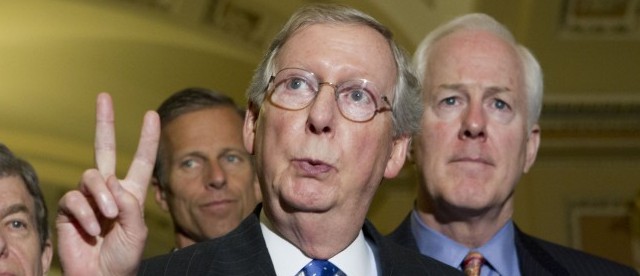On Wednesday, the Senate once again capitulated to yet another lifting of the nation’s debt ceiling, this time suspending any limits on borrowing for a full year. This means that, until March 2015, the government can continue to borrow with reckless abandon until its greedy, bloated heart is content.
Videos By Rare
Unsurprisingly, it was establishment Republicans Mitch McConnell and John Cornyn, men who never saw a spending increase they didn’t like, who finally ended up crossing party lines and joining Democrats to end debate on the bill. It was a predictable move, but an important one in forcing McConnell to once more show his true colors in an election year when he is already polling behind his Democratic challenger.
It is to the credit of men like Ted Cruz that they held firm and refused to give fellow Republicans a pass for selling out their principles.
As to why Republicans decided to forfeit their only bargaining chip and allow a clean debt ceiling suspension with no accompanying reforms of any kind, there have been several explanations.
The most popular is one of priorities.
It is more important to focus on ObamaCare, they say. By picking their battles, Republicans have a better chance of winning against a law that is literally falling apart as we speak, than in fighting for spending cuts that seem never to happen.
It is true that it is easier to make a case against ObamaCare than against raising the debt ceiling. The massive new health entitlement is costing people insurance coverage, costing jobs and picking the pockets of young people to subsidize the old.
On the other hand, government spending is responsible for things people like, such as public parks, NPR and food stamps. It’s much harder to convince people to give up free goodies than to attempt to rescue them from a law that is making them actively worse off.
But if the case against ObamaCare is easy, it is almost trivially so. Already, the law has proven unsustainable beyond anything we could have imagined. The president continues—illegally—to delay parts of the law to suit his political purposes, a tacit concession of how terrible it actually is. If voters do not demand the repeal of the Affordable Care Act, there is still a decent chance that it will topple under its own weight before too long.
More importantly, ObamaCare is not the single biggest threat to America’s future; the debt is.
The national debt is now greater than the country’s entire annual output. This is a big deal because, historically, nations that allow their debt to surpass 100 percent of GDP have difficulty recovering and suffer from low economic growth. The fact that this happens around the same time as a grindingly slow recovery from a recession and—surprise!—low economic growth is unlikely to be wholly coincidental.
Right now, thanks to the Federal Reserve’s irresponsible practice of devaluing the currency through quantitative easing, interest rates remain incredibly low, which dulls the impact of a high level of debt, but this is a situation that cannot last forever. At some point, rates will rise and interest payments on the debt will skyrocket, wreaking havoc with the federal budget.
The Congressional Budget Office has projected that by 2025, every penny of the budget will be consumed by Medicare, Medicaid, Social Security and interest payments on the debt, meaning that absolutely anything else government does—including national defense—will have to be done with borrowed money.
That there are still so many in government who do not see this as a pressing problem or a battle worth fighting indicates either a deep level of denial or a willful attack on American prosperity. The spending battle is so important that it is worth going to bat for every time, even if the odds of winning are slim. Democrats will always fight tooth and nail to prevent even the smallest cuts, but “must pass” bills such as the debt ceiling are Republicans’ best opportunity to fight for reform, or at least to bring the national conversation back to the subject of spending.
So far, the right has been far too meek and ineffective at explaining to the American people why the debt matters.
Last year, in both the case of the government shutdown and the much-feared sequestration cuts, we learned that, despite Democrats’ prophecies of doom, the world does not stop turning when government backs off a little. The more often we can demonstrate to people how inessential government is, the better the chance of reducing spending and debt in the future.
But conceding—even for the overt political purposes of the 2014 elections—that a failure to raise the debt ceiling would result in economic catastrophe is playing right into the hands of those that intend to increase spending forever, without limit.
The first rule of debate is not to accept the flawed premises of the opposition. The real economic catastrophe comes not from reining in spending, but from what happens if we don’t stop living on borrowed money and borrowed time.

